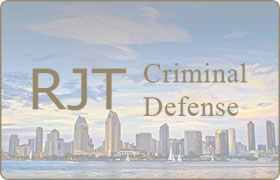San Ysidro Criminal Lawyer, California
Sponsored Law Firm
-
 x
x

Click For More Info:
-
RJT Criminal Defense
2820 CAMINO DEL RIO SOUTH STE 110 SAN DIEGO,CA» view mapDUI Defense, Drug Crimes, Homicide San Diego Criminal Defense Lawyer
San Diego's Experienced,Aggressive Criminal Defense Team is Here. Don’t leave your case, or your future, to chance. Contact us, find out what we can do for you.
800-697-9361 -
- Contact
- Free Evaluation
- Visit:
- Website
- Profile
Thomas J. Filicia
✓ VERIFIEDThomas J. Filicia is a practicing lawyer in the state of California who handles Criminal defense cases.
Keith Howard Rutman
✓ VERIFIEDI am a criminal defense attorney in San Diego, California who focuses on drug crimes, domestic violence, weapons charges, theft, police misconduct, an... (more)
Vikas Bajaj
✓ VERIFIEDAttorney Vikas Bajaj is widely regarded as one the leading criminal defense attorneys in San Diego, CA. With over 16 years experience, Mr. Bajaj has s... (more)
Elliott N. Kanter
✓ VERIFIEDIf you're seeking a criminal defense attorney or personal injury lawyer in San Diego who will look out for your best interests, you've come to the rig... (more)
Ernest Lee
✓ VERIFIEDMy name is Ernest J. Lee Sr. I founded the Lee Law Group, (LLG) in 2007 after working for four different law firms in the greater San Diego Area. Fran... (more)
Jorge Javier Jaramillo
✓ VERIFIEDJorge Jaramillo is a practicing lawyer in the state of California handling criminal and family law matters.
Jacob Prescott Austin
✓ VERIFIEDOver the years I have worked on cases spanning many areas of law such as marriage dissolution issues, transferring trademarks, elder abuse, financial ... (more)
FREE CONSULTATION
CONTACTFREE CONSULTATION
CONTACT
 Ryan James Tegnelia San Diego,CA
Ryan James Tegnelia San Diego,CA About UsRyan James Tegnelia
About UsRyan James Tegnelia Contact UsContact Us Today!!
Contact UsContact Us Today!!








